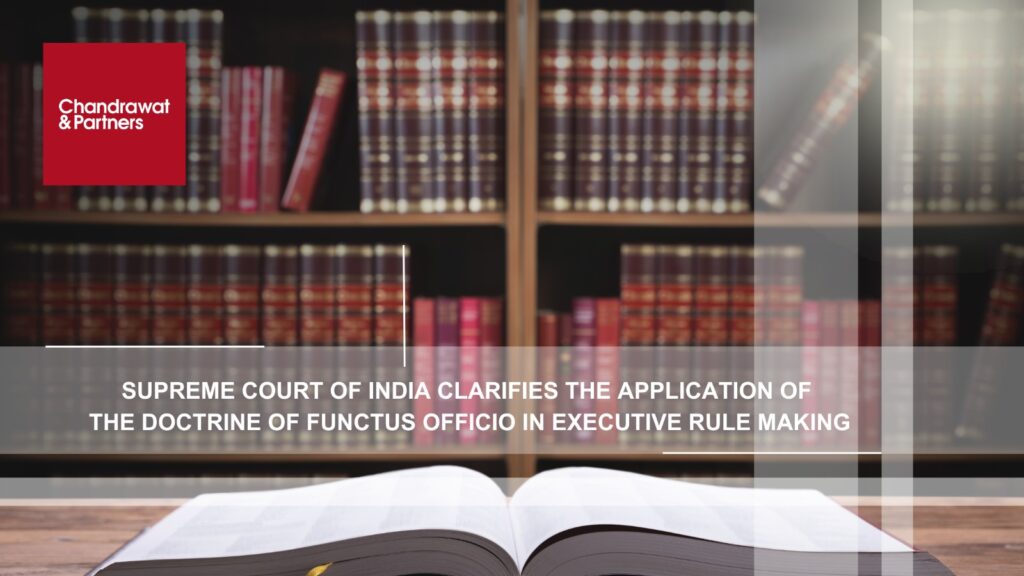Home > Recent Judgements >Supreme Court of India Clarifies the Application of the Doctrine of Functus Officio in Executive Rule-Making
Feb 17, 2025
SUPREME COURT OF INDIA CLARIFIES THE APPLICATION OF THE DOCTRINE OF FUNCTUS OFFICIO IN EXECUTIVE RULE-MAKING
The Supreme Court of India delivered a significant judgment in the case of P. Rammohan Rao vs. K. Srinivas, which addressed the application of the legal principle functus officio in the context of executive rule-making authorities. This judgment provides clarity on the scope of the principle and its relevance to different bodies within the government, particularly the distinction between judicial, quasi-judicial, and executive authorities.
What is the Principle of Functus Officio?
The principle of functus officio is a Latin term that essentially means “having performed one’s office.” In legal terms, it refers to the idea that once a decision-making authority has completed its function or made a decision, it no longer has the power to alter, amend, or revisit that decision. This principle is typically applied to judicial and quasi-judicial bodies, where a decision, once made, is final and cannot be changed unless there is a provision for review or appeal.
The Judgment in P. Rammohan Rao vs. K. Srinivas
In the case of P. Rammohan Rao vs. K. Srinivas, the Supreme Court was faced with the question of whether the doctrine of functus officio should apply to executive rule-making authorities. The Court ruled that the principle does not apply to executive authorities engaged in rule-making. This was a critical distinction because, if applied to executive authorities, the principle could potentially paralyze the government’s ability to modify or adapt policies to changing circumstances.
The Court emphasized that executive authorities, particularly those involved in rule-making, need the flexibility to change or amend rules and regulations as required. Applying functus officio to rule-making functions would hinder the government’s ability to effectively govern and respond to evolving needs and challenges. In other words, the ability to alter policies or rules is essential for the dynamic functioning of the executive branch.
Reference to Orissa Administrative Tribunal Bar Association v. Union of India
The Court’s judgment in P. Rammohan Rao vs. K. Srinivas also referenced its earlier ruling in the case of Orissa Administrative Tribunal Bar Association v. Union of India. In that case, the Supreme Court had observed that applying the functus officio doctrine to administrative decision-making would severely hamper the executive power. Such an application would render the state incapable of revising or reversing decisions, even when those decisions no longer served the public interest or when new information became available.
The Court in the Orissa Administrative Tribunal case had already pointed out that functus officio should not be applied to administrative or executive bodies since it would undermine their ability to adapt, modify, and make changes to policies that serve the best interests of the public.
Clarifying the Distinction: Judicial vs. Executive Bodies
One of the most important aspects of this judgment is the distinction the Supreme Court made between judicial/quasi-judicial bodies and executive bodies. While the principle of functus officio remains relevant and applicable to judicial and quasi-judicial bodies, which must act impartially and have finality in their decisions, it does not extend to executive authorities involved in rule-making.
Judicial and quasi-judicial bodies, such as courts and tribunals, are expected to make decisions based on the facts before them. Once a decision is made, it is final, and they do not possess the authority to change that decision unless under specific conditions provided by law, such as in the case of an appeal or review. However, executive authorities, which are responsible for creating, amending, or repealing rules and regulations, need to have the flexibility to adapt their decisions based on changing circumstances or new information.
Implications of the Judgment
This judgment is a significant one because it upholds the flexibility of executive bodies in carrying out their rule-making functions. It ensures that the government has the necessary latitude to amend, modify, or repeal rules and regulations when required. This is particularly important in areas such as policy formulation, economic regulation, and public administration, where changes in societal needs, technological advancements, or economic conditions may necessitate quick and responsive regulatory adjustments.
Additionally, the judgment protects the executive branch from being hindered by legal doctrines that might prevent it from acting in the best interest of the nation. It reaffirms that executive decisions related to rules and policies must remain dynamic and adaptable, without being bound by the finality inherent in judicial decision-making processes.
Conclusion
The Supreme Court’s ruling in P. Rammohan Rao vs. K. Srinivas marks a significant clarification regarding the scope of the principle of functus officio. By distinguishing between judicial/quasi-judicial and executive bodies, the Court has reinforced the idea that rule-making authorities within the executive branch must retain the power to revise or update policies and regulations as necessary. This judgment protects the flexibility of the executive branch, ensuring that the government can continue to effectively govern and adapt to changing circumstances.
In essence, the judgment underscores the dynamic nature of executive functions and ensures that administrative bodies are not hamstrung by doctrines meant for judicial finality. It is a reminder that the government must have the capacity to evolve and adjust its policies to meet the demands of a constantly changing society.
For more information or queries, please email us at
[email protected]





